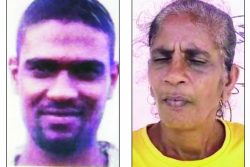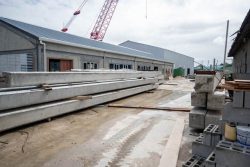Speaker of the House, Ralph Ramkarran says parliamentary reforms have resulted in an explosion of questions and motions primarily by the opposition and around 50% of bills now go to special select committees.
Delivering an address at the 14th Biennial Conference of Presiding Officers and Clerks of the Caribbean, the Americas and the Atlantic Region of the Commonwealth Parliamentary Association in St Lucia last week, Ramkarran laid out the reforms that had been implemented in Guyana since 1994.
He noted that in the years leading up to the restoration of democracy in 1992 “the reputation of the National Assembly in the eyes of the public was at an extremely low point because its public image had been destroyed”.
Speaking on the theme `Improving the public image of Parliament’ Ramkarran pointed out that the first attempt at reforms was made by the new government in 1994 when the Standing Orders were amended.
The next series of efforts in early 2000 culminated in the constitutional reform process. The resultant Constitution Reform Commission mandated the setting up of four sectoral committees “spanning the entire gamut of government activity to monitor the development and implementation of government policy”, Ramkarran said. Two studies by the Common-wealth Parliamentary Association also recommended wide-ranging reforms.
Ramkarran pointed to what he said was the unique composition of the committees flowing from the reform.
“The four Sectoral Committees have rotating chairs and deputy chairs, that is, a government and opposition member take turns every year in these positions. They are required to make annual reports of their work to the Parliament. The Parliamentary Management Committee, which discusses Parliamentary business, consists of five government and five opposition members. It is chaired by the Speaker who has no vote. Decisions are therefore by consensus.”
The Speaker also adverted to other reforms such as the amendment of the Standing Orders to provide for question time, the requirement for the Executive to reply to reports of the Public Accounts Committee within three months and the reports of the Parliamentary Sectoral Committees within 60 days.
Further, he said, the autonomy of parliament office has been recommended in relation to staffing and budget and a special select committee is addressing the implementation of this.
“As a result of these developments there has been an explosion of questions and motions, mainly by the Opposition. There are no unanswered questions or motions which have not been debated except for current ones.
About fifty percent of bills now go to Special Select Committees starting from about ten percent in 2001”, Ramkarran asserted.
He added that these developments fully backed by the government and opposition “have helped to restore some degree of public confidence in our Parliament”.
The US-funded Millen-nium Challenge Account Threshold Programme will also assist in training for the committees’ division and upgrade the work of the Public Accounts Committee and the Economic Services Committee. It will also transform the library into a state of the art facility.
However, he said, much more needs to be done in the public information arena.
“While Parliament is televised, there is some dissatisfaction by the Opposition that they are not getting a fair representation in the State owned media. There are no broadcasting regulations and an attempt a few years ago to arrive at an agreed set of principles was rejected by the media organization. We have not yet been able to establish a public relations department because of lack of resources. Low skills and low salaries are a hindrance to more rapid progress”, Ramkarran told the gathering at the conference held under the theme `Empowering Parliament for the Enhancement of our Democracies’.
He posited that despite the televising of debates by the state and private television maintaining public interest in parliament is a challenge.
Based on the experience of Guyana and other countries he then listed benchmarks which would be useful to consider.
A Resourced and Equipped Parliament
To be fully resourced and equipped a Parliament must have:
* Adequate and trained office staff;
* Modern equipment and information technology:
* An up to date library;
* A website for Parliament;
* Constituency offices, staff and equipment for Parliamentarians;
* Availability of expert advice and research assistance for Parliamentarians;
Accountability of the Executive
It is not the duty of the Clerk or the Speaker to make the Executive accountable. This is the responsibility of Parliamentarians and the Executive. However, it is the responsibility of all parties to create the conditions necessary for maximum accountability of the Executive and these include:
* A committee system to monitor the development and implementation of executive policy;
* A functioning Public Accounts Committee;
* A developed select committee system to give detailed consideration to bills, if so desired by Parliamentarians;
* Constant exchange of experiences between Parliamentarians of the region and elsewhere;
* An independent Parliament Office in accordance with Latimer House Recommendations;
Public Information
An adequate and diverse public information system is vital to ensure that the public is aware of the work of Parliament and Parliamentarians in delivering services to the public which they were elected to do. Such a system would include:
* A Parliamentary website;
* Broadcasting and televising debates by Parliament;
* A developed relationship with the media based on agreement or legislation;
* Engagements with civil society;
* Public information and outreach programmes;
* Visiting by schoolchildren and others;
* Establishment of a Youth Parliament.
Implementation of these would allow a Parliament to begin to be seen as discharging its responsibilities. For it to be properly accomplished the Parliament “must develop the capacity to ensure the accountability of the executive to the electorate”, the Speaker said.






